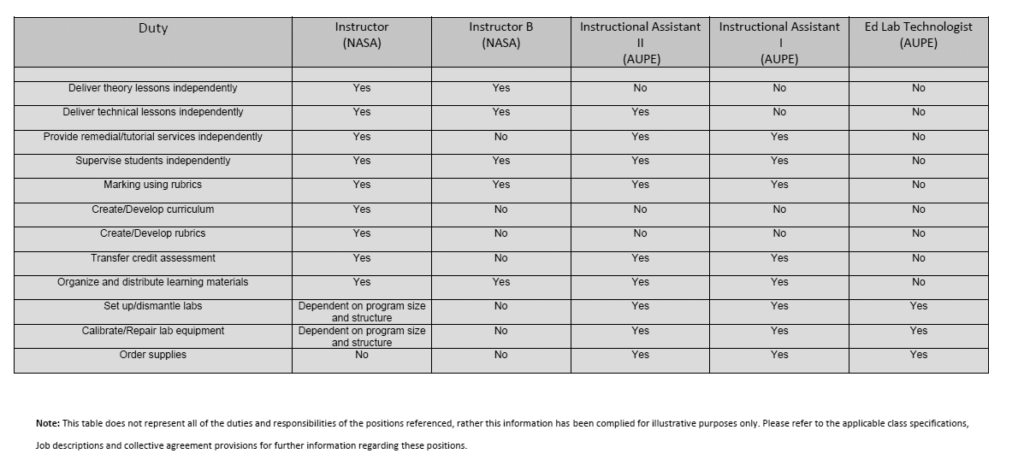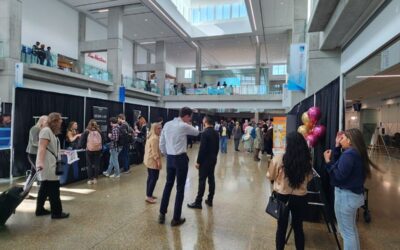There are many types of instructors at NAIT with varying responsibilities. Instructors run most programs, deliver theory and technical lessons, mark student work, create rubrics and more. In 2021, the School of Business ran a pilot program to test out Instructional Assistants—essentially classroom helpers that don’t teach, but could help with supervising students, answering the typical beginning of term questions and assisting with marking. But in 2023, NAIT began holding consultations to discuss a new type of Instructional Assistant that could deliver technical lessons—something that the NAIT Academic Staff Association (NASA) is “hugely concerned” about.
Their main concerns revolve around the lack of clarity in the Instructional Assistant II (IA2) role. According to a NAIT HR document the Nugget obtained, the only difference between an IA1 and IA2 is that IA2s can teach “technical lessons.” But as Shauna MacDonald, NASA President, explained, there’s some grey area for how that actually looks in the classroom.
“They like to think that theory is taught in a classroom and the technical stuff is taught in a shop or a lab,” said MacDonald. “But it’s actually preposterous because sometimes you teach theory in a lab. Sometimes you might have a lab before you’ve ever even seen your students in a classroom.”
“If a student comes up to an IA2 in the classroom and asks them a theory question, can that be answered by an IA2? By collective agreement rights, no, it can’t. But none of this is being communicated.”

Jordan Schultz, a NAITSA Senator and Geomatics student, expressed concern about their impact in such a hands-on school.
“That practicality and theory goes hand in hand,” said Schultz. “They can tell you to push a button, but they couldn’t tell you why.”
NASA’s other concern revolves around the quality of IA2 instruction. MacDonald explained that an IA2 position is being paid 30 per cent less than instructors, despite needing the same credentials an instructor would have.
“NAIT doesn’t see any concern with this, because they’re hiring people with the exact same credentials as an instructor,” she said. “But they’re being paid 30 per cent less, and so some of the concerns are what kind of quality are you getting?”
“You’re not getting the people that can get any job in industry. You’re potentially getting people who can’t get jobs in industry for whatever reason, so they’ll settle for this.”
While instructional assistants have been used at other academic institutions, MacDonald said not enough research has been done on the effectiveness of this particular type.
“I have yet to be shown any research that this works well,” said MacDonald. “That there’s a particular ratio that works, that this doesn’t negatively impact the student experience, or that maybe it’s favourable for students … we still don’t actually have a lot of these answers. I don’t feel that they’ve done their due diligence in researching the academic impacts of instructional assistance in the classroom.”
NASA has filed a bad-faith bargaining complaint with the Alberta Labour Relations Board, along with several grievances. They also delivered a petition to NAIT at the Town Hall on October 20.
The petition received over 600 signatures—a historic number. “It’s the only petition that I know of in NASA’s history … it is unheard of that this many people in NASA got together and shared their concerns,” said MacDonald.
“These 600 signatures were not just instructors and chairs. There were signatures from every single constituency, so even librarians and counselors and curriculum instructional specialists see that this is a big deal.”
NAIT has declined to comment on the petition, aside from an email on December 12 from Peter Leclaire, NAIT Vice President Academic, to MacDonald and NASA members. In the email, Leclaire acknowledged the petition and the concerns of NASA members, but felt given the legal proceedings underway, that it was inappropriate for him to comment. When a motion passed to review the use of IA2s at an Academic Council meeting, who “makes recommendations to the Board of Governors about academic policy related to student admissions, courses and programs, academic awards and other academic matters,” the Board of Governors declined the request. NAIT also declined when the Nugget reached out for comment on the use of IA2s, again saying that because legal proceedings were underway, NAIT representatives were “unable to accommodate a media request at [this] time.”
While NAIT has not been transparent about the reasons behind the use of IA2s, MacDonald thinks it was a financial decision. “I think that this is a money decision. I think this has a lot to do with the provincial government’s lack of funding to institutions,” she said.
“So on one hand, I will place the blame firmly on the provincial government. However, I don’t think this is the best solution. I think that it’s shortsighted.”





